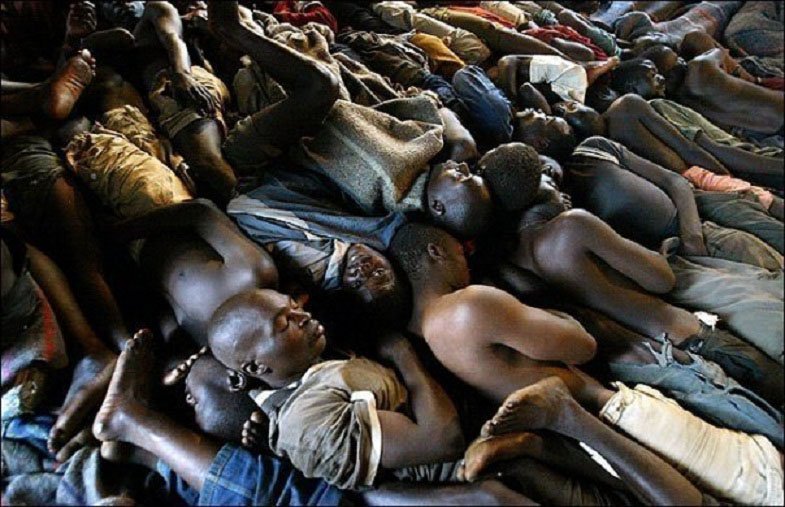
A camp in Kaduna, where the police rescued hundreds of inmates living in harsh conditions, is rightly provoking outrage in many quarters. All hell broke loose last weekend when the police raided the Ahmad bin Hambal Centre for Islamic Teachings in Rigasa, Igabi Local Government Area. Hitherto regarded as a centre for imparting morals and education, the police shockingly met hordes of inmates in dehumanising conditions. There is a need to hunt and close down all such illegal torture centres across the country.
Acting on a tip-off, the police freed about 300 boys and men, while arresting seven so-called teachers. An account by the BBC has a higher toll of 500, some as young as five years. The government, however, insists that only 190 were rescued. Gory pictures of brutalised inmates, their legs chained to vehicle wheels and a generator, obviously to prevent their escape, are trending on the Internet. This is a classic case of man’s inhumanity to man.
Some of the inmates claimed they were sexually abused and tortured, saying that those who were caught trying to escape were tied to the ceiling and suspended in the air as punishment. The inmates said they were starved deliberately. In some of the photographs, festering sores from the beatings they suffered covered their bodies and could result in infection if medical intervention is delayed. While Ali Janga, the Commissioner of Police, Kaduna State, aptly described the home as a “house of torture,” teachers at the centre said they only taught Islamic education, and that parents and relations willingly brought their children and wards to be trained or healed of their waywardness. That claim has to be rigorously investigated by the Kaduna State Government.
Similar questionable homes were uncovered in parts of Lagos State at the weekend, where police rescued 19 pregnant women and four children. In what is becoming a familiar tale, the BBC said 160 children had been rescued by the Nigerian authorities from “baby factories” in the past one year.
Among such other homes where deprivations were the order of the day, was a ritual camp in Agungun, Ibadan, capital of Oyo State, where the police saved 20 people in June. The camp had been operating as a “spiritual and healing” home for those suffering from mental illness. But it was only a cover to deceive neighbours. In March 2014, another slave/ritual camp in Soka, Ibadan, where hundreds of people taken by abductors reportedly died, was uncovered, with skeletons and decomposing bodies littering the premises. It was a similar story in August 2016, when the police rescued 13 children and 15 adults locked up in another “healing” centre at Oke-Ira, in Ogba area of Lagos.
In other climes, where laws are strongly enforced, odious crimes of this nature are severely punished. The major response to this outrage should be immediate and diligent prosecution of the jailors, as well as the parents and guardians who gave out their relatives for illegal detention. This was the case when David and Louise Turpin were convicted of abusing all but one of their 13 children in the city of Perris, Southern California, in the United States. The children, aged between two and 29 years, were locked up under filthy conditions in a house that looked harmless from the outside for at least nine years, and were only allowed outside on Halloween and during family trips to Disneyland.
Such was the ordeal that the children were made to endure by their parents that when one of them, a 17-year-old girl, was able to sneak out of the house she quickly spilled the beans. After admitting to the abuse of their children, David, 57, and Louise, 50, were condemned to spending the rest of their lives behind bars, unless they were granted parole after 25 years. In another horrific incident in Austria, the law was very swift in catching up with Josef Fritzl, who had confined his daughter, Elizabeth, in the basement of the family building for 24 years; he bagged a life jail.
The man inexplicably kept his daughter, 18, in the basement without the knowledge of his wife who was living in the house with him until the girl was 42 years. In the incestuous relationship that followed, he successfully fathered seven children with Elizabeth, out of which one died. For 24 years, Fritzl’s daughter and some of the children born in the dungeon could not see the daylight until the day they were rescued.
In another case that attracted global attention, a man was arrested by the police in Cleveland, Ohio, USA on May 6, 2013 for kidnapping and holding three women in their teens captive for between nine and 11 years. Ariel Castro was arraigned on 977 charges, including kidnapping, rape and aggravated murder only two days later; and, by August, he was sentenced to consecutive life terms and 1,000 years jail. In addition to a $100,000 fine, he forfeited all his property to the county.
In Nigeria, victims must also be served justice. Ignorance or good intention as feigned by some of those who brought their relations to the torture house should never be excused. This case should serve as a deterrent to others.
Going forward, states should develop, staff, equip and fund their social welfare departments for effective surveillance, public enlightenment and enforcement of related laws. Training and establishment of rehabilitation centres should be a priority. In the West, social workers are well motivated and their work valued and professionalised. Units should also be set up in the state police commands dedicated to detecting such nefarious activities and centres and bringing perpetrators to justice.
Police and other state agencies should deploy intelligence-led surveillance and undercover operatives to monitor suspicious organisations and quickly interdict criminal activities.
END

Be the first to comment